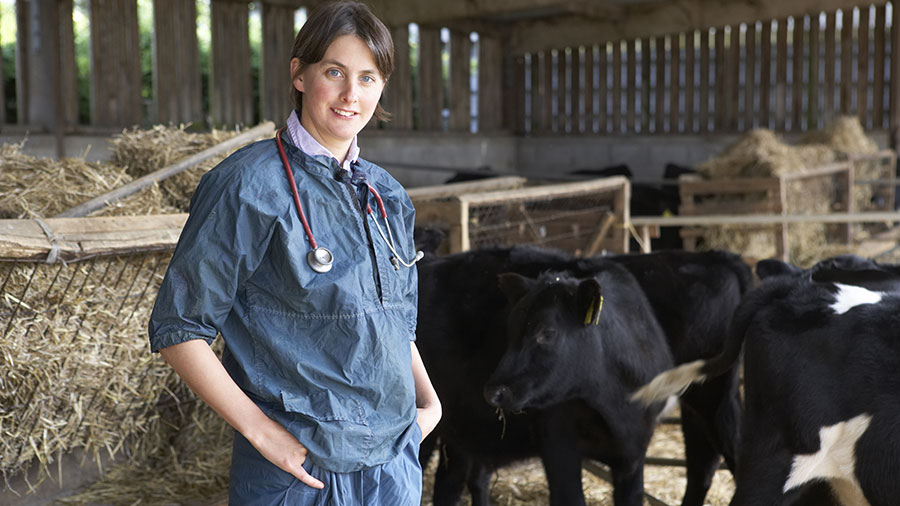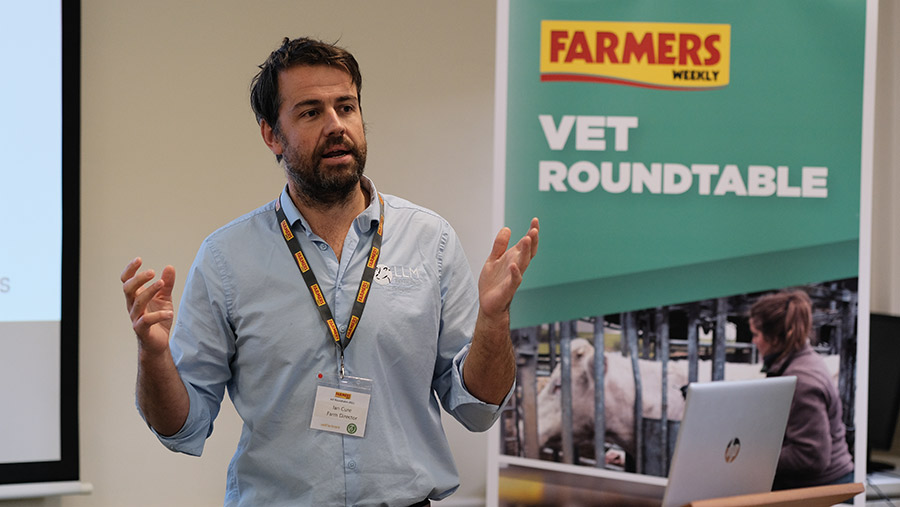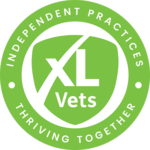4 ways to improve farm vet recruitment and retention rates
 © AdobeStock/Monkey Business
© AdobeStock/Monkey Business The farm veterinary sector is facing unprecedented challenges that are placing growing pressure on farm services.
While the number of UK vets registering with the Royal College of Veterinary Surgeons (RCVS) to practise in the UK has remained constant – at about 500 each year – the number of non-UK vets has fallen dramatically.
In the year to August 2019, non-UK vet registrations totalled 757; two years later, this had fallen to 250, with the British Veterinary Association estimating a shortfall of 3,000 vets and reporting an unfilled vacancy rate of 11.5%.
In addition, since Brexit, more clinical vets have been diverted into alternative roles in slaughterhouses and signing transportation certificates.
“The system is starting to creak. We have managed to keep it together so far, but demand is only increasing,” warned farm vet Jonathan Statham.
Farmers Weekly carried out an exclusive survey of practising farm vets which revealed further areas of positivity and concern.
The overwhelming majority of farmers were highly satisfied with their vet.
However, there were high levels of dissatisfaction among vets, caused by excessive workload, stress, bovine TB testing and discrimination, with one in two vets claiming to have faced discrimination as a student or practising vet.
See also: Vet survey reveals serious challenges ahead for profession
The RCVS estimates that vets only stay in practice for seven years once qualified. In addition, our survey revealed that 5% of respondents wanted to leave the farm veterinary profession.
Farmers Weekly invited farmers and vets to a roundtable discussion at Harper Adams University in Shropshire, where a new veterinary school has recently been opened in conjunction with Keele University, to find out how the industry can meet these challenges head on.
Below are four key areas where delegates believe change is needed to create a vibrant farm veterinary sector that is fit for the future.
1. Improve recruitment rates
Challenges
- There are too many “James Herriot” role models in the mainstream media, based on outdated stereotypes.
- The image of a vet as male, with top grades at A-levels and from a farming background, is false. The typical vet is female; some will have taken resits and not all are from farming backgrounds.
- There are more opportunities to move out of general practice into specialised roles, with fewer out-of-hours and flexible-working opportunities.
- Vet school students need As in sciences, excluding some very capable students.
- Recruiting for perfection is problematic – interns and young vets fear being struck off if they make a mistake, and they see asking for help as a failure.
Solutions
- Encourage mainstream media to better reflect the diversity and wider careers available within the farm vet sector.
- Celebrate more diverse role models (females and ethnic minorities) in the industry.
- Redefine the role of a modern farm vet so young people understand it involves a wide range of disciplines, including data. analysis, team leadership and engineering, as well as the typical “Herriot” roles.
- Encourage vet schools to reassure students that it’s part of the process to get things wrong, to learn from mistakes and that there’s no shame in asking for help.
- Farm vets and industry bodies must engage with schoolchildren at a younger age, to encourage them to take up a career as a farm vet.
- Launch a programme like Farmer Time, so vets can showcase to schools what they do.
- Link up with farms to organise an Open Vet Sunday, like Linking Environment and Farming’s Open Farm Sunday.
- Encourage more vet schools to disrupt traditional recruitment models. Harper and Keele Veterinary School looks for more practical skills, and accepts students who have studied animal-related biosciences.
2. Improve retention rates
Challenges
- Because vet students are very high achievers, they can turn their hand to a huge range of opportunities in other areas with better pay, fewer hours and no out-of-hours shifts.
- Many farm vets are lost to small animal practice, where out-of-hours provision is often outsourced, other vets are in the building to offer help, a veterinary nurse is usually in attendance, and there is easy access to resources.
- There can be a shameful stigma attached to being a farm vet because of the negative narrative created by vegans and environmental lobbyists on social media, and in the mainstream media.
- Vets are afraid of speaking out against misinformation around high-profile TB cases, and farming’s role in climate change, for fear of reprisal.
- Often a farmer has one main vet who can feel like they are on-call 24/7, even when they are not scheduled to work.
Solutions
- Offer more role models who demonstrate vets can have families and careers/practice ownership.
- Show the career progression and salary structure within the practice.
- Create a positive narrative around being a farm vet, and promote the farmer-vet relationship, which is highly valued and based on genuine care.
- Vets who want to set the record straight should be better supported by veterinary bodies and be offered media training.
- Remodel existing working hours and encourage part-time/flexible working to allow vets to balance childcare, lifestyle choices, or other interests such as academia.
- For example, vet Paula Scales has prioritised flexible working and redefined typical working hours, setting up Haywood Farm Vets in Market Drayton. Neither she nor her colleague, Tom Jackson, work more than four days a week. They finish early each day, as standard, and ensure out-of-hours provision is manageable by having a compact practice area.
- Follow the example of the best farm vet practices in supporting new vets, for instance, on out-of-hours calls.
- Re-attract the vets who have already moved into industry, academia or work with other animal species, or have travelled to broaden their experience, and wish to return.
- If someone moves on after five years, don’t see it as a failure. Make those five years as good as possible.
- Practices must recognise the value everyone brings to the business with varied skillsets.
- Trial having a “key account vet” for each farm, with specialised vets who can help in other areas to reduce the dependency on individuals.
3. Kick out discrimination
Challenges
- Discrimination is happening to vets on-farm and within practices.
- Students are reporting discrimination while on placement.
- Discrimination is based on sex, ethnicity and age. Physical stature – regardless of gender – is also an issue and difficult to counter against male bravado.
- Often it is subtle or the result of unconscious bias, and brushed off as “banter”, but it can have a huge impact on how valued that person feels.
Solutions
- Provide vets and farmers with training on equality, diversity and inclusion.
- Encourage open conversations with farmers about difficult subjects.
- Recognise and call out inappropriate behaviour immediately and address it – and offer support to those who have experienced it.
- Equip managers and new vets with the confidence to confront discriminatory behaviour and have difficult conversations with those accused of discrimination (a strong farmer-vet relationship makes this easier).
- Practices and veterinary bodies should have an accessible complaints procedure. This should be reviewed regularly to ensure it is effective and empowers and supports vets.
4. Remodel how we manage TB
Challenges
- The survey revealed 66% of vets thought TB testing was an unfulfilling part of the job.
- Yet it took up one-quarter of vets’ time, on average.
Solutions
- Treat TB like other infectious diseases to give farmers greater control in managing it (this principle was spear-headed by the TB Advisory Service and now Cattle Health Certification Standards (Checs).
- In England, there are now 180 Approved Tuberculin Testers (ATTs) to help reduce the pressure on vets. Wider rollout of these across the UK would further help free up vets to do more specialised jobs.
- An alternative is to value the positives of TB testing: outsourcing testing might be good for managing workload but it will impact out-of-hours rotas, and it is often the time when the vet can see and lay hands on every animal. Use it as an opportunity for discussion with the farmer about broader health issues.
- Either way, ensure vets get more involved with TB as an infectious disease entity, interpreting results and putting together disease-control strategies in liaison with the Animal and Plant Health Agency (Apha) vets.
- To achieve this, greater collaboration, knowledge-sharing and communication are required between Apha and private vets.
Vet Roundtable delegates

Ian Cure, farm director at VetPartners © MAG/Colin Miller
- Alfonso Camassa, beef production veterinary consultant, Mossvet
- Ruari Martin, director of farm operations and innovations, Myerscough College and University Centre
- Sarah Tomlinson, Kingshay veterinary consultant and TB Advisory Service technical director
- Hannah Batty, vet and director at LLM Farm Vets
- Ian Cure, farm director at VetPartners
- James Russell, senior vice-president at the British Veterinary Association
- Andrew Curwen, chief executive at XLVets
- Kate Richards, president at the Royal Veterinary College of Surgeons
- Helen Rogers, director at Friars Moor Livestock Health
- Richard Blackburn, dairy farmer and NFU Cheshire chairman
- Rob Drysdale, veterinary consultant
- Jonathan Statham, farm vet and chief executive of Raft Solutions, as well as professor at Harper and Keele Veterinary School
- Paula Scales, director at Haywood Farm Vets
- Zack Such, vet at Rosevean Veterinary Practice
Thanks to XLVets and VetPartners, whose sponsorship made it possible to host the roundtable. Farmers Weekly had full editorial control of this report.
Partners’ messages
Vet Partners
VetPartners is at the forefront of the farm industry evolution, enhancing the health of livestock and supporting farmers to be more productive, efficient and sustainable. We are committed to investing in our people, our practices and the latest technology and providing the very best advice to help UK agriculture grow.
Sharing knowledge and listening to the farming community is key to helping shape the future of the industry.
XLvets
XLVets is a thriving community of independent, farm veterinary practices. Members of our community are proud of their independent status and the freedom it provides to focus on our patients, clients and people.
As a community, our members are committed to working together, sharing knowledge and experience to deliver the highest standards of livestock healthcare.
With increasing recognition of how sustainable farming and food production will evolve, we stand ready to support our clients to meet new ways of working for the benefit of animals, farmers, society and the planet.


